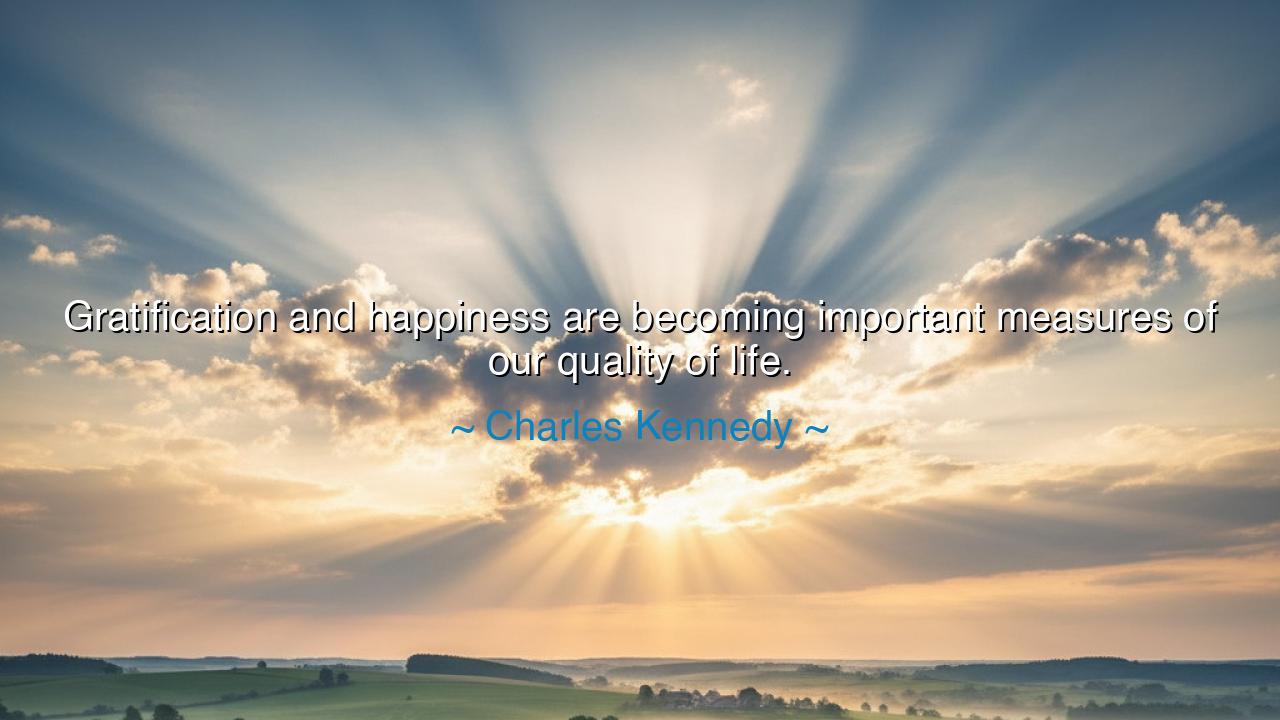
Gratification and happiness are becoming important measures of






In an age of restless striving and endless pursuit, Charles Kennedy spoke words that ring with timeless truth: “Gratification and happiness are becoming important measures of our quality of life.” Though born in a modern tongue, these words carry an ancient spirit — a reminder that wealth and power, progress and possession, are but hollow trophies if the heart remains empty. The essence of a good life cannot be weighed in gold nor measured in status, but in the quiet joy that springs from a contented soul.
To the ancients, the quality of life was not found in the abundance of things, but in the harmony between man and virtue, between body and spirit. The philosopher Aristotle spoke of Eudaimonia, the flourishing of the soul — a happiness rooted not in fleeting pleasure, but in living a life of purpose and moral balance. What Charles Kennedy echoed in his time was this same eternal teaching, translated for a modern world: that true progress must serve the heart as much as the hand, that the measure of civilization is not its towers or machines, but the well-being of its people.
Gratification, as he spoke it, was not the indulgence of whims, but the rightful satisfaction that comes when effort meets fulfillment. It is the reward of living meaningfully, of tasting the fruit of one’s labor with gratitude rather than greed. Yet how easily mankind mistakes indulgence for joy, consumption for contentment. The modern world multiplies pleasures yet starves for peace. Kennedy’s words remind us that progress without happiness is decay disguised as success — a kingdom rich in gold but poor in soul.
Consider the story of Emperor Ashoka, ruler of a vast Indian empire. His reign began in conquest and bloodshed, his ambition unrelenting. Yet after the great battle of Kalinga, as he walked among the dead, he saw that victory had brought him no peace. His empire was mighty, but his heart was broken. In that moment of awakening, he turned from war to wisdom, from domination to compassion. He embraced Dharma — the path of righteousness — and sought not to expand his borders, but to elevate the happiness of his people. Temples were built not for power, but for healing; laws were written not for control, but for mercy. In this transformation lies the proof of Kennedy’s truth: that the quality of life is measured not by what a man or nation can take, but by what it can nurture.
Happiness, in its purest form, is not the loud laughter of pleasure but the steady warmth of peace. It is the soul’s agreement with itself. It is found in honest work, in kindness shared, in the ability to rest one’s head without regret. When Kennedy spoke of gratification and happiness as measures of a nation’s strength, he did not speak of luxury, but of humanity. He called for societies that honor joy as much as profit, that value mental rest as much as material success.
So let this wisdom be heard, not as a whisper but as a summons: strive for a world where well-being is the highest wealth. Let governments and families alike remember that people are not machines of labor, but beings of heart. Teach the young that joy is not purchased, but cultivated. Build communities not only of trade and technology, but of compassion and connection. For without happiness, even the grandest civilization is but an empty shell.
Therefore, the lesson endures — to seek gratification not in endless gain, but in balance; to seek happiness not in escape, but in meaning. Work with purpose, rest with gratitude, and live with kindness. Measure your life not by how much you possess, but by how deeply you feel. For when gratification and happiness become your compass, you will walk a path both prosperous and pure.
Thus, the teaching closes with the wisdom of the ages: the true quality of life is not built in the marketplace or counted in coins, but felt in the quiet peace of a fulfilled heart. Guard that peace as your greatest treasure, and you shall know what it means to truly live.






AAdministratorAdministrator
Welcome, honored guests. Please leave a comment, we will respond soon